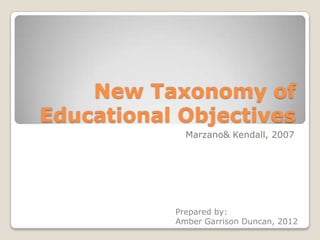
New Taxonomy of Educational Objectives
- 1. New Taxonomy of Educational Objectives Marzano& Kendall, 2007 Prepared by: Amber Garrison Duncan, 2012
- 2. Provides a model (predictive) of cognitive processing instead of a framework (loosely organized principles that describe characteristics). All mental processes can be learned, even the most complex or difficult. Mental processes cannot be ordered hierarchically in terms of difficulty. Rather they can be ordered hierarchically in the order of which they are controlled. The difficulty of a process is a function of 2 things: ◦ The steps involved in mentally processing the flow of information (these do not change). ◦ The individuals level of familiarity with the process and the level of consciousness needed to perform the process (this can change). Thinking skills should be taught throughout the curriculum, not just after students mastered the subject knowledge. Major difference from Bloom’s is clarity of action from the object of action. Knowledge is the object of action by mental processes. Characteristics of the New Taxonomy
- 3. Controls Sets goals and 4. Knowledge Information 5. Meta-Cognitive System Knowledge Cognitive System 6. Self System Engagement designs Utilization Mental Examines strategies for 3. Analysis Procedures importance, accomplishing 2. Comprehension goals. Interacts Psychomotor efficacy, 1. Retrieval emotional with cognitive response and system to motivation. achieve goals. Steps of Mental Processing Also demonstrates highest demand of consciousness to lowest Systems of Thinking
- 4. All tasks start in the self system. Network of interrelated goals and beliefs used to make judgments about engaging in new tasks. Personal beliefs and values determine if the individual deems the task important. Includes motivation, emotional response, and efficacy. Self System
- 5. In charge of conscious operations relative to knowledge including goal setting, process monitoring, and monitoring for clarity and accuracy. Four Functions ◦ Specifying Goals- sets goals and strategies to accomplish goals ◦ Process Monitoring- effectiveness of a procedure being used in a task ◦ Monitoring Clarity- individual must decide to approach task with clarity ◦ Monitoring Accuracy- individual must decide to approach task with accuracy Metacognitive System
- 6. Responsible for the processing of the information needed to complete the task. Responsible for analytic operations such as making inferences, comparing, and classifying. Four Processes ◦ Retrieval ◦ Comprehension ◦ Analysis ◦ Knowledge Utilization Cognitive System
- 7. The object of action for the three systems. Plays a key role in ability to successfully engage in a new task. Three Categories ◦ Information or declarative knowledge (vocabulary, terms, facts, principles, concepts) ◦ Mental Procedures or procedural knowledge (the “how-to” procedures) ◦ Psychomotor Procedures (physical action) Knowledge
- 8. Retrieval of knowledge for processing as guided by Metacognitive System Sensory Working Permanent Memory Memory Memory •Temporary (seat of •All information, Outside World storage of data consciousness) skills, processes from the senses. known are stored •Where data is here. actively processed. Memory
- 9. Innate process, generally done without conscious awareness. Is a matter of the type of knowledge ◦ Information Recognition- matching of stimulus with information in permanent memory Recall-transfer of details from permanent memory into working memory to be consciously processed ◦ Procedural knowledge Can be recognized and recalled as it has information embedded. Procedural knowledge is executed in this process. Cognitive System: Retrieval
- 10. Responsible for translating knowledge into a form for storage in permanent memory. Information is processed into two mode: linguistic or imagery. Translation occurs by integrating and symbolizing ◦ Integrating- Mixing of new knowledge with old knowledge in permanent memory and distilling it down to key characteristics in a general form. ◦ Symbolizing- the process of creating symbolic (nonlinguistic) analog of the knowledge. Cognitive System: Comprehension
- 11. The reasoned extension of new knowledge not already possessed by the individual. Requires conscious and rigorous application, forcing the learner to cycle through knowledge multiple times, changing and refining it along the way. There are five processes: ◦ Matching- identify similarities/differences ◦ Classifying- organizing into meaningful categories ◦ Analyzing errors- logic, reasonableness and accuracy of knowledge ◦ Generalizing- construct new generalizations from information already known or observed ◦ Specifying- generating new applications of a known generalization or principle Cognitive System: Analysis
- 12. Processes employed to accomplish a specific task. Four categories ◦ Decision making- must select between 2 or more alternatives ◦ Problem Solving- identify obstacles to a goal, select and evaluate alternatives ◦ Experimenting- generating and testing hypothesis for purpose of understanding ◦ Investigating- identifying what is known, identifying areas of confusion/controversy, provide an answer and logically constructed argument Cognitive System: Knowledge Utilization
- 13. Psychomotor Procedures Level of Consciousness Mental Procedures Level 6: Self System Information Conscious Level 5: Metacognitive System Cognitive System Level 4: Knowledge Utilization Level 3: Analysis Level 2: Comprehension Automatic Level 1: Retrieval Two-Dimensional Model
